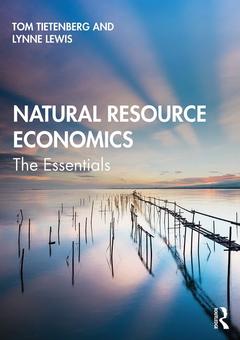Natural Resource Economics: The Essentials

Natural Resource Economics: The Essentials offers a policy-oriented approach to the increasingly influential field of natural resource economics that is based upon a solid foundation of economic theory and empirical research. Students will not only leave the course with a firm understanding of natural resource economics, but they will also be exposed to a number of case studies showing how underlying economic principles provide the basis for specific natural resource policies. Including current data and research studies, this key text also highlights what insights can be derived from the actual experience.
Key features include:
- Extensive coverage of the major issues including energy, recyclable resources, water policy, land conservation and management, forests, fisheries, other ecosystems, and sustainable development;
- Introductions to the theory and method of natural resource economics including externalities, experimental and behavioral economics, benefit-cost analysis, and methods for valuing the services provided by the environment;
- Boxed ?Examples? and ?Debates? throughout the text which highlight global examples and major points for deeper discussions.
The text is fully supported with end-of-chapter summaries, discussion questions, and self-test exercises in the book, as well as with multiple-choice questions, simulations, references, slides, and an instructor?s manual on the Companion Website. This text is adapted from the best-selling Environmental and Natural Resource Economics,11th edition, by the same authors.
Preface. An Overview of the Book. 1. Visions of the Future. 2. The Economic Approach: Property Rights, Externalities, and Environmental Problems. 3. Evaluating Trade-Offs: Benefit-Cost Analysis and Other Decision-Making Metrics. 4. Valuing the Environment: Methods. 5. Dynamic Efficiency and Sustainable Development. 6. Depletable Resource Allocation: The Role of Longer Time Horizons, Substitutes, and Extraction Cost. 7. Energy: The Transition from Depletable to Renewable Resources. 8. Recyclable Resources: Minerals, Paper, Bottles, and E-Waste. 9. Water: A Confluence of Renewable and Depletable Resources. 10. A Locationally Fixed, Multipurpose Resource: Land. 11. Storable, Renewable Resources: Forests. 12. Common-Pool Resources: Commercially Valuable Fisheries. 13. Ecosystem Goods and Services: Nature’s Threatened Bounty. 14. The Quest for Sustainable Development. 15. Visions of the Future Revisited. Answers to Self-Test Exercises. Glossary. Index
Tom Tietenberg is the Mitchell Family Professor of Economics, Emeritus at Colby College, Maine, USA.
Lynne Lewis is Elmer W. Campbell Professor of Economics at Bates College, Maine, USA.
Date de parution : 08-2019
18.9x24.6 cm
Date de parution : 09-2019
18.9x24.6 cm
Thèmes de Natural Resource Economics: The Essentials :
Mots-clés :
Concession Agreements; economic policy; Catch Share Programs; natural resources; Private Management Decisions; energy economics; Marginal Net Benefit Curve; energy; Quantity Profile; recyclable resources; National Academies; land management; Marginal User Cost; land conservation; Marginal Net Benefit; water policy; Marginal Extraction Cost; fisheries; Flood Insurance; sustainable development; Energy Sources; natural resource policies; Conservation Easements; economic principles; Energy Policy; natural resource economics; Total Marginal Cost; Bid Rent Function; Curbside Recycling; HDI; Maximum Sustainable Yield; Optimal Rotation Period; Energy Efficiency; Instream Flows; Carbon Sequestration Credits; Competitive Fringe; Increasing Block Rates; Dynamic Efficiency Criterion



